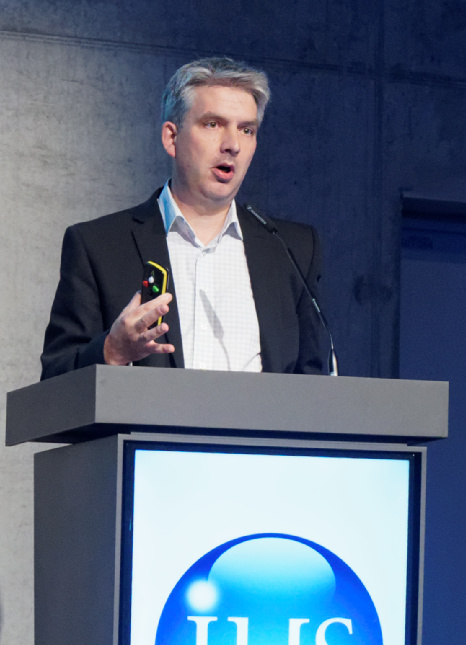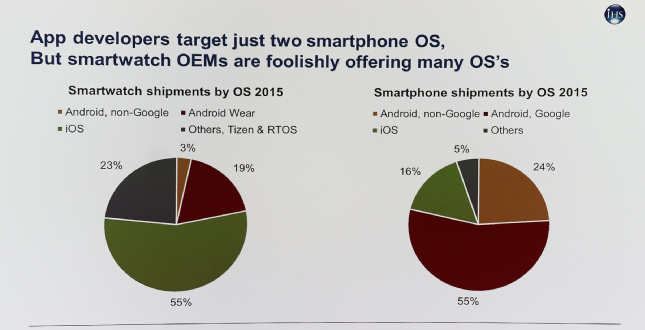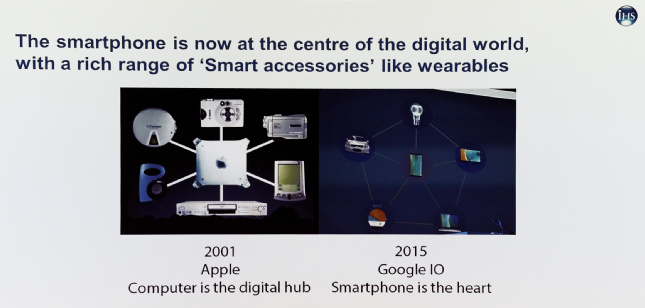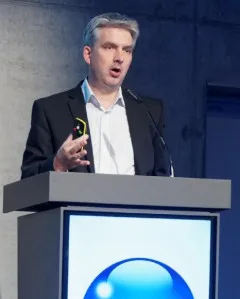 Ian Fogg is originally from the cable TV business, but now looks at the mobile industry for IHS. He gave a high bandwidth talk that started by looking at the mistakes that had been made in the mobile market.
Ian Fogg is originally from the cable TV business, but now looks at the mobile industry for IHS. He gave a high bandwidth talk that started by looking at the mistakes that had been made in the mobile market.
Apps drive the market, and transformed the market to new growth in 2008/9 when the mobile market was stalling. No single company can develop all the apps, services and content. Execute well and you can drive a virtuous circle by building an attractive platform and leveraging 3rd party developers who want to exploit the platform.
If you build a good platform, that is well executed, you can develop a strong ecosystem. Bad platforms (e.g. smart TVs, Symbian) only get used for simple applications. You can’t buy the ecosystem, you have to build it.
Only Apple and Android are mainstream – everything else is niche – even platforms from big and powerful companies such as Microsoft. App developers are so busy developing for those two, they have no time for Windows or Tizen.

Apple has done very well in moving its existing ecosystem into new categories such as watches. It had many of the main apps on the watch very quickly after the product launch.
Smartwatches will only succeed if there are few (one?) platforms – if not Apple will win as it has a simple platform. The iPhone platform is so strong that even non-Apple companies are making accessories that work with Apple’s platform. Even Google has extended its watch platform (Android Wear) compatible with the iPhone. Samsung announced that its Gear S2 has some high profile apps, but it doesn’t have the ecosystem, so Samsung has made its new watch compatible with the iPhone.
Android devices don’t always have the Google API and that is a problem because you can’t exploit features such as in-app purchases that apps expect. That means that developers can’t generate revenue. If Google Play is not available, online advertising may be of little or no good. Fogg said “Android is not one platform”.
The challenge in China is that there is no Google Play platform. There are lots of app stores and 90% of the installed base is Android. Fogg said that there is a lot of talk of Google re-entering China, but he thinks that Google will struggle if it goes into the market. Effectively the fragmentation means a trade barrier for apps and services.
There is massive fragmentation in the Chinese market, with ferocious competition and many players, but globally it’s about Samsung and Apple. Chinese players are trying to go global, but they have to take their ecosystems with them.
You often hear about “connectivity”, but everything will be connected, Fogg said. The real question is “which device is smart”? When Google and Apple brought smarts into the phone market, it exploded. You see the same in wearables. Some devices use the smarts in a phone. The competition is in the smarts.
Turning to iPod, it peaked after the iPhone launch, which is counter-intuitive. But Apple preferred to disrupt itself rather than wait for someone else to do it. The iStore could sell music, but there are other ways to get music. Apple makes most of its money (90%) from hardware – 61% to 69% of it’s revenue is from the iPhone.
The IoT is also about smarts rather than connectivity as connections are a given, every device will be connected, he reiterated. The smartphone is the digital hub of the consumer’s life, but in 2001, it was the PC that was the hub (see Jobs’ slide below). Google sees the world this way, with cars, cameras and other devices on the ends of the spokes from the smartphone hub.

Smart device apps are ideal to drive engagement which can allow in-use purchases. Fogg said it’s not about the IoT, it’s about smart modular devices such as SmartTVs. In conclusion, it’s apps that drive the market and you have to use big platforms, which means Apple and Android. Smart is more important than connected. Fogg said you need to look across all devices like Spotify – one price to listen on all devices.
In responding to a question about social media, Fogg said that there are only two global communications channels, Whatsapp and Facebook Messenger, others are regional. Communication drives engagement, and engagement allows monetisation. WeChat may be the most advanced in this area.
Answering to a question about future ecosystems, Fogg said that the main category for 4K video is smartphones. Many consumers can record 4K video, but they can’t play back unless TV companies hurry to introduce 4K TVs.
In questions, Fogg also pointed out that you can now be the biggest smartphone vendor in the world without actually entering the US market. That’s a big change from the past.
In response to another question about the future of cinema, Morrod said that cinema is a social experience so good TVs will not kill the cinema market. Fogg said that the wine you drink outside the home may be better than what you buy in a bar, but many people still like to go to a bar. He did warn, however, that cinema makers have to keep improving the experience to make it different from being at home. Gray said that 3D is a good example – it didn’t work at home where there are distractions and an un-optimised experience. Morrod said that many people have 5.1 systems, but few have optimised them.
Replying to another question, Fogg pointed out that as platforms are now connected (such as consoles), their lifetime can be extended by software updates. That can be a good thing or a bad thing. You can add features and make improvements. You can also extend a relationship with the consumer. On the other hand, you may ship too early, or you can delay the update cycle, which is bad for the industry.

